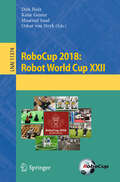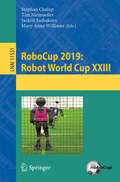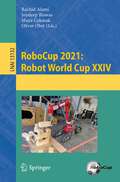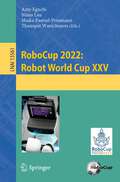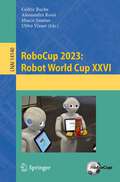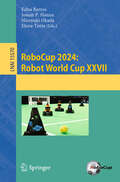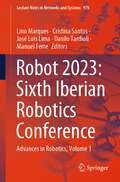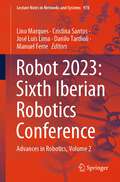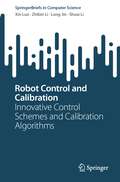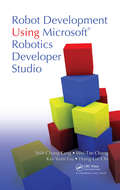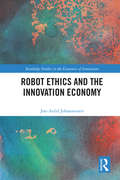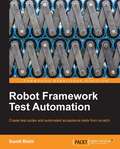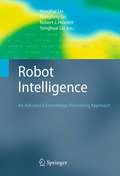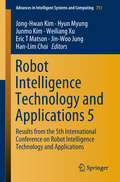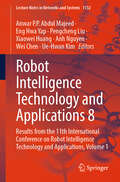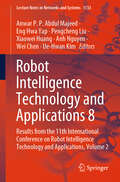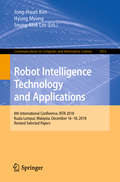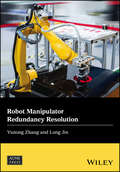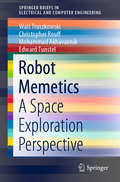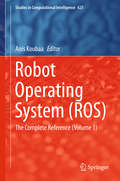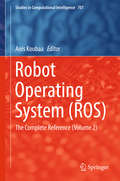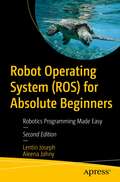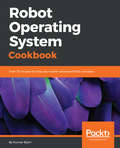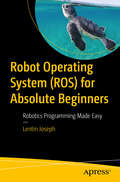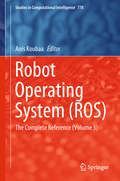- Table View
- List View
RoboCup 2018: Robot World Cup XXII (Lecture Notes in Computer Science #11374)
by Dirk Holz Katie Genter Maarouf Saad Oskar Von StrykThis book includes the post-conference proceedings of the 22nd RoboCup International Symposium, held in Montreal, QC, Canada, in June 2018. The 32 full revised papers and 11 papers from the winning teams presented were carefully reviewed and selected from 51 submissions. This book highlights the approaches of champion teams from the competitions and documents the proceedings of the 22nd annual RoboCup International Symposium. Due to the complex research challenges set by the RoboCup initiative, the RoboCup International Symposium offers a unique perspective for exploring scientific and engineering principles underlying advanced robotic and AI systems.
RoboCup 2019: Robot World Cup XXIII (Lecture Notes in Computer Science #11531)
by Mary-Anne Williams Stephan Chalup Tim Niemueller Jackrit SuthakornThis book includes the post-conference proceedings of the 23rd RoboCup International Symposium, held in Sydney, NSW, Australia, in July 2019. The 38 full revised papers and 14 invited papers presented in this book were carefully reviewed and selected from 74 submissions. This book highlights the approaches of champion teams from the competitions and documents the proceedings of the 23rd annual RoboCup International Symposium. Due to the complex research challenges set by the RoboCup initiative, the RoboCup International Symposium offers a unique perspective for exploring scientific and engineering principles underlying advanced robotic and AI systems.
RoboCup 2021: Robot World Cup XXIV (Lecture Notes in Computer Science #13132)
by Oliver Obst Rachid Alami Joydeep Biswas Maya CakmakThis book constitutes the proceedings of the 24th RoboCup International Symposium which was held online during June 22 - June 28, 2021.The 19 full papers included in these proceedings were carefully reviewed and selected from 42 submissions; the volume also includes 10 RoboCup Champions Papers. In addition to presenting the proceedings of the RoboCup 2021 Symposium, the book highlights the approaches of champion teams from the competitions. Due to the complex research challenges set by the RoboCup initiative, the RoboCup International Symposium offers a unique perspective for exploring scientific and engineering principles underlying advanced robotic and AI systems.
RoboCup 2022: Robot World Cup XXV (Lecture Notes in Computer Science #13561)
by Nuno Lau Amy Eguchi Maike Paetzel-Prüsmann Thanapat WanichanonThis book constitutes the proceedings of the 25th RoboCup International Symposium which was held online during July 2022 in Bangkok, Thailand. The 28 full papers included in these proceedings were carefully reviewed and selected from 40 submissions; the volume includes 12 papers from the winners of the RoboCup 2022 competitions under the Champions Track. The RoboCup International Symposium focuses on the science behind the advances in robotics, including the key innovations that led the winning teams to their success, and the outcomes of research inspired by challenges across the different leagues at RoboCup.
RoboCup 2023: Robot World Cup XXVI (Lecture Notes in Computer Science #14140)
by Ubbo Visser Cédric Buche Alessandra Rossi Marco SimõesThis book constitutes the proceedings of the 26th RoboCup International Symposium which was held in Bordeaux, France, during July 4-10, 2023. The 25 regular papers included in these proceedings were carefully reviewed and selected from 47 submissions; the volume also includes 11 RoboCup Champions Papers. In addition to presenting the proceedings of the RoboCup 2023 Symposium, the book highlights the approaches of champion teams from the competitions. Due to the complex research challenges set by the RoboCup initiative, the RoboCup International Symposium offers a unique perspective for exploring scientific and engineering principles underlying advanced robotic and AI systems.
RoboCup 2024: Robot World Cup XXVII (Lecture Notes in Computer Science #15570)
by Elena Torta Edna Barros Josiah P. Hanna Hiroyuki OkadaThis book constitutes the proceedings of the 27th RoboCup International Symposium which was held in Eindhoven, The Netherlands, during July 15-22, 2024.The 34 regular papers included in these proceedings were carefully reviewed and selected from 58 submissions.The technical challenges brought on by the RoboCup initiative motivate novel scienti c and engineering strategies for developing complete, advanced robotic systems. The RoboCup Symposium fosters the sharing of these approaches and advances the science of robotics by enabling building upon the progress of others. This book also presents contributed technical papers from the champions of the 2024 competition's constituent leagues. These papers describe the key approaches necessary for winning the respective competition.
Robot 2023: Advances in Robotics, Volume 1 (Lecture Notes in Networks and Systems #976)
by Manuel Ferre José Luís Lima Danilo Tardioli Cristina Santos Lino MarquesThis text will be replaced by the correct backcovertext / informationtext as soon as we get it.
Robot 2023: Advances in Robotics, Volume 2 (Lecture Notes in Networks and Systems #978)
by Manuel Ferre José Luís Lima Danilo Tardioli Cristina Santos Lino MarquesThis book contains a selection of papers accepted for presentation and discussion at ROBOT2023, the Sixth Iberian Robotics Conference, held in the University of Coimbra, Coimbra, Portugal, during November 22nd-24th, 2023. ROBOT2023 is part of a series of conferences that are jointly organized by Sociedade Portuguesa de Robótica (SPR) / Portuguese Society for Robotics and by Sociedad Española para la Investigación y Desarrollo en Robótica (SEIDROB) / Spanish Society for Research and Development in Robotics. These conferences, now occurring with a yearly periodicity, provide a forum to roboticists mostly from Iberia, but also from other parts of the world, to present and discuss their research results, new developments, and applications in the field of Robotics. The volume 1 of this book contains 45 papers addressing fundamental aspects of mobile robotics and robot manipulation while volume 2 contains 45 papers covering the application of robotics in different domains and environments.
Robot Control and Calibration: Innovative Control Schemes and Calibration Algorithms (SpringerBriefs in Computer Science)
by Shuai Li Long Jin Xin Luo Zhibin LiThis book mainly shows readers how to calibrate and control robots. In this regard, it proposes three control schemes: an error-summation enhanced Newton algorithm for model predictive control; RNN for solving perturbed time-varying underdetermined linear systems; and a new joint-drift-free scheme aided with projected ZNN, which can effectively improve robot control accuracy. Moreover, the book develops four advanced algorithms for robot calibration – Levenberg-Marquarelt with diversified regularizations; improved covariance matrix adaptive evolution strategy; quadratic interpolated beetle antennae search algorithm; and a novel variable step-size Levenberg-Marquardt algorithm – which can effectively enhance robot positioning accuracy. In addition, it is exceedingly difficult for experts in other fields to conduct robot arm calibration studies without calibration data. Thus, this book provides a publicly available dataset to assist researchers from other fields in conducting calibration experiments and validating their ideas. The book also discusses six regularization schemes based on its robot error models, i.e., L1, L2, dropout, elastic, log, and swish. Robots’ positioning accuracy is significantly improved after calibration. Using the control and calibration methods developed here, readers will be ready to conduct their own research and experiments.
Robot Development Using Microsoft Robotics Developer Studio
by Shih-Chung Kang Wei-Tze Chang Kai-Yuan Gu Hung-Lin ChiThe Microsoft Robotics Developer Studio (MSRDS) and LEGO robots together offer a flexible platform for creating robotic systems. Designed for novices with basic programming skills, Robot Development Using Microsoft Robotics Developer Studio provides clear instructions on developing and operating robots. It includes an extensive array of examples, w
Robot Ethics and the Innovation Economy (Routledge Studies in the Economics of Innovation)
by Jon-Arild JohannessenThis book provides an authoritative resource on the topic of intelligent robots, artificial intelligence and the ethical implications of these revolutionary innovations. It examines the moral and ethical problems that arise in relation to the development, design and use of intelligent robots, which are capable of autonomous or semi-autonomous decision-making. These problems might relate, for example, to medical robots, driverless cars, intelligent military drones, pedagogical robots, police robots, legal robots and many others. The main question addressed in this book is how we can understand, explain and apply the concept of ethics in relation to intelligent robots and artificial intelligence. In each chapter, the author examines a different aspect of this question. The author also questions how we can ensure that intelligent robots are of service to humans and under what conditions intelligent robots could become more ethical than humans. The book employs an original approach to examining this cutting-edge research question, combining different research areas, and offers a wealth of practical relevance and real-world examples, illustrated through vivid case studies. With its jargon free approach and a dedicated chapter on relevant concepts at the end, this book is also accessible to readers without prior knowledge on intelligent robots and the Fourth Industrial Revolution. By providing a general account of this debate, and of the consequences of the innovations resulting from these trends, the book serves as an important contribution to the discussion and will find a natural readership among scholars and students of the innovation economy and those concerned with the ethical considerations arising in the wake of the Fourth Industrial Revolution
Robot Framework Test Automation
by Sumit BishtWritten in an engaging, easy-to-follow style, this practical guide will teach you to create test suites and automated acceptance Tests with the Robot Framework.If you are an automation engineer, QA engineer, developer or tester who is looking to get started with Robot Framework, as well as find a standardized testing solution, this book is ideal for you. No prior knowledge of Robot Framework or acceptance testing is required, although a basic knowledge of Python is required for few sections of the book.
Robot Intelligence
by Yonghuai Liu Robert J. Howlett Dongbing Gu Honghai LiuRobot intelligence has become a major focus of intelligent robotics. Recent innovation in computational intelligence including fuzzy learning, neural networks, evolutionary computation and classical Artificial Intelligence provides sufficient theoretical and experimental foundations for enabling robots to undertake a variety of tasks with reasonable performance. This book reflects the recent advances in the field from an advanced knowledge processing perspective; there have been attempts to solve knowledge based information explosion constraints by integrating computational intelligence in the robotics context.
Robot Intelligence Technology and Applications 5: Results From The 5th International Conference On Robot Intelligence Technology And Applications (Advances In Intelligent Systems and Computing #751)
by Jong-Hwan Kim Hyun Myung Junmo Kim Weiliang Xu Eric T Matson Jin-Woo Jung Han-Lim ChoiThis book includes papers from the 5th International Conference on Robot Intelligence Technology and Applications held at KAIST, Daejeon, Korea on December 13–15, 2017. It covers the following areas: artificial intelligence, autonomous robot navigation, intelligent robot system design, intelligent sensing and control, and machine vision.The topics included in this book are deep learning, deep neural networks, image understanding, natural language processing, speech/voice/text recognition, reasoning & inference, sensor integration/fusion/perception, multisensor data fusion, navigation/SLAM/localization, distributed intelligent algorithms and techniques, ubiquitous computing, digital creatures, intelligent agents, computer vision, virtual/augmented reality, surveillance, pattern recognition, gesture recognition, fingerprint recognition, animation and virtual characters, and emerging applications.This book is a valuable resource for robotics scientists, computer scientists, artificial intelligence researchers and professionals in universities, research institutes and laboratories.
Robot Intelligence Technology and Applications 8: Results from the 11th International Conference on Robot Intelligence Technology and Applications, Volume 1 (Lecture Notes in Networks and Systems #1132)
by Wei Chen Pengcheng Liu Xiaowei Huang Anh Nguyen Eng Hwa Yap Anwar P.P. Abdul Majeed Ue-Hwan KimThis book delves into the forefront of robotics and AI with this scholarly collection from the 11th International Conference on Robot Intelligence Technology and Applications (RiTA) Volume 1. This book consists of two Sections/Chapters, namely Sensors, Signals and Systems and Robotics, Automation and Control. The former elucidates the pivotal role of sensors, signals and systems in propelling advancements in robotics and AI, while the latter illuminates the transformative power of autonomous systems across various sectors, from intricate surgical procedures to complex manufacturing processes. This book is an indispensable resource for both researchers and practitioners, offering a comprehensive overview of the digital trajectory of robotics and AI.
Robot Intelligence Technology and Applications 8: Results from the 11th International Conference on Robot Intelligence Technology and Applications, Volume 2 (Lecture Notes in Networks and Systems #1133)
by Wei Chen Anwar P. P. Abdul Majeed Pengcheng Liu Xiaowei Huang Anh Nguyen Eng Hwa Yap Ue-Hwan KimThis book dives into the vanguard of robotics and AI with this scholarly edition, a compilation of pioneering research from the 11th International Conference on Robot Intelligence Technology and Applications (RiTA) Volume 2. This book focuses on ‘Machine Learning and AI Applications’, which elucidates the transformative power of contemporary AI across a multitude of domains, from medical diagnostics to natural language comprehension. This book uncovers innovative models, avant-garde training techniques and sophisticated interpretability methods that underscore the versatility and robustness of AI. This book is an indispensable asset for researchers and practitioners navigating the digital frontier.
Robot Intelligence Technology and Applications: 6th International Conference, RiTA 2018, Kuala Lumpur, Malaysia, December 16–18, 2018, Revised Selected Papers (Communications in Computer and Information Science #1015)
by Jong-Hwan Kim Hyung Myung Seung-Mok LeeThis book constitutes revised selected papers from the 6th International Conference on Robot Intelligence Technology and Applications, RiTA 2018, held in Putrajaya, Malaysia, in December 2018. The 20 full papers presented in this volume were carefully reviewed and selected from 80 submissions. The papers present studies on machine learning; optimization; modelling and simulation; path planning; neural networks; landmark recognition; and reinforcement learning.
Robot Manipulator Redundancy Resolution
by Yunong Zhang Long JinIntroduces a revolutionary, quadratic-programming based approach to solving long-standing problems in motion planning and control of redundant manipulators This book describes a novel quadratic programming approach to solving redundancy resolutions problems with redundant manipulators. Known as ``QP-unified motion planning and control of redundant manipulators'' theory, it systematically solves difficult optimization problems of inequality-constrained motion planning and control of redundant manipulators that have plagued robotics engineers and systems designers for more than a quarter century. An example of redundancy resolution could involve a robotic limb with six joints, or degrees of freedom (DOFs), with which to position an object. As only five numbers are required to specify the position and orientation of the object, the robot can move with one remaining DOF through practically infinite poses while performing a specified task. In this case redundancy resolution refers to the process of choosing an optimal pose from among that infinite set. A critical issue in robotic systems control, the redundancy resolution problem has been widely studied for decades, and numerous solutions have been proposed. This book investigates various approaches to motion planning and control of redundant robot manipulators and describes the most successful strategy thus far developed for resolving redundancy resolution problems. Provides a fully connected, systematic, methodological, consecutive, and easy approach to solving redundancy resolution problems Describes a new approach to the time-varying Jacobian matrix pseudoinversion, applied to the redundant-manipulator kinematic control Introduces The QP-based unification of robots' redundancy resolution Illustrates the effectiveness of the methods presented using a large number of computer simulation results based on PUMA560, PA10, and planar robot manipulators Provides technical details for all schemes and solvers presented, for readers to adopt and customize them for specific industrial applications Robot Manipulator Redundancy Resolution is must-reading for advanced undergraduates and graduate students of robotics, mechatronics, mechanical engineering, tracking control, neural dynamics/neural networks, numerical algorithms, computation and optimization, simulation and modelling, analog, and digital circuits. It is also a valuable working resource for practicing robotics engineers and systems designers and industrial researchers.
Robot Memetics: A Space Exploration Perspective (SpringerBriefs in Electrical and Computer Engineering)
by Christopher Rouff Edward Tunstel Walt Truszkowski Mohammad AkhavannikThis book provides a novel perspective on the concept of memetics as applied to the development and evolution of intelligent robots and robotic communities/cultures. It provides a framework for the emergence of a hybrid community of people and intelligent robots collaborating to realize mutual benefits and scientific objectives. It aims to show that as the hybrid community emerges, so does its culture. Once this foundational work is done, the book illustrates the robot memetic ideas in the context of a space exploration scenario based on the development and operation of a human/robot settlement on Mars.
Robot Operating System (ROS)
by Anis KoubaaThe objective of this book is to provide the reader with a comprehensive coverage on the Robot Operating Systems (ROS) and latest related systems, which is currently considered as the main development framework for robotics applications. The book includes twenty-seven chapters organized into eight parts. Part 1 presents the basics and foundations of ROS. In Part 2, four chapters deal with navigation, motion and planning. Part 3 provides four examples of service and experimental robots. Part 4 deals with real-world deployment of applications. Part 5 presents signal-processing tools for perception and sensing. Part 6 provides software engineering methodologies to design complex software with ROS. Simulations frameworks are presented in Part 7. Finally, Part 8 presents advanced tools and frameworks for ROS including multi-master extension, network introspection, controllers and cognitive systems. This book will be a valuable companion for ROS users and developers to learn more ROS capabilities and features.
Robot Operating System (ROS)
by Anis KoubaaThe objective of this book is to provide the reader with a comprehensive coverage on the Robot Operating Systems (ROS) and latest related systems, which is currently considered as the main development framework for robotics applications. The book includes twenty-seven chapters organized into eight parts. Part 1 presents the basics and foundations of ROS. In Part 2, four chapters deal with navigation, motion and planning. Part 3 provides four examples of service and experimental robots. Part 4 deals with real-world deployment of applications. Part 5 presents signal-processing tools for perception and sensing. Part 6 provides software engineering methodologies to design complex software with ROS. Simulations frameworks are presented in Part 7. Finally, Part 8 presents advanced tools and frameworks for ROS including multi-master extension, network introspection, controllers and cognitive systems. This book will be a valuable companion for ROS users and developers to learn more ROS capabilities and features.
Robot Operating System (ROS) for Absolute Beginners: Robotics Programming Made Easy
by Lentin Joseph Aleena JohnyStart programming your own robots using Robot Operation System (ROS). Targeted for absolute beginners in ROS, Linux, and Python, this guide lets you build your own robotics projects. You'll learn the basic foundation of Ubuntu Linux. Begin with the fundamentals. Installation and useful commands will give you the basic tools you need while programming a robot. Then add useful software applications that can be used while making robots. Programming robots can be done using any of the programming languages. Most popular programming languages are Python and C++. You will incorporate the fundamentals of C++ by learning object oriented programing concepts from example and building C++ projects.Finally, tackle an ROS hands-on project to apply all the concepts of ROS you've learned. The aim of the project is to perform a dead-reckoning using a cheap mobile robot. You can command your robot's position on Rviz and your robot will move to that position! Not only will you learn to program, you'll gain hands-on experience working with hardware to create a real robot.What You’ll LearnInstall Ubuntu 20Install ROS NoeticUse ROS Programming with roscpp and rospy Build a mobile robot from scratch using ROSWho This Book Is ForRobotics enthusiast with little or no prior programming experience.
Robot Operating System Cookbook: Over 70 recipes to help you master advanced ROS concepts
by Kumar BipinLeverage the power of ROS to build exciting collaborative robots.Key FeaturesDelve into an open source, meta-operating system for your robotGet acquainted with tools and libraries for building and running code on multiple platformsUse Gazebo to model your robot and create a virtual environmentBook DescriptionThis book will leverage the power of ROS with an introduction to its core and advanced concepts through exciting recipes. You will get acquainted with the use of different synchronous and asynchronous communication methods, including messages, services, and actions. You will learn how to use the various debugging and visualization tools used in development and how to interface sensors and actuators with the ROS framework.Firstly, you will get to grips with ROS simulation frameworks, such as Gazebo and RotorS for modeling and simulating any physical robot and virtual environment. You will also cover mobile robotics, micro-aerial vehicles, and robotic arms, which are the leading branches of robotic applications. Robot Operating System Cookbook will also guide you in the development of an autonomous navigation framework for both mobile robots and micro-aerial vehicles.Finally, you will explore ROS-Industrial, an open source project that extends the advanced capabilities of ROS software to manufacturing industries.What you will learnExplore advanced concepts, such as ROS pluginlib, nodelets, and actionlibWork with ROS visualization, profiling, and debugging toolsGain experience in robot modeling and simulation using GazeboUnderstand the ROS Navigation Stack for mobile robotsConfigure a MoveIt! package for a manipulator robotDevelop an autonomous navigation framework for MAV using ORB SLAM and MoveItIntegrate sensors, actuators, and robots into the ROS ecosystemGet acquainted with the ROS-Industrial package with hardware support, capabilities, and applicationsWho this book is forIf you’re a researcher or engineer with an interest in the problems, solutions, and future research issues that you may encounter in the development of robotic applications, this book is for you. Basic knowledge of C++ and Python programming with the GNU/Linux environment is strongly recommended to assist with understanding the key concepts covered in the book.
Robot Operating System for Absolute Beginners: Robotics Programming Made Easy
by Lentin JosephLearn how to get started with robotics programming using Robot Operation System (ROS). Targeted for absolute beginners in ROS, Linux, and Python, this short guide shows you how to build your own robotics projects.ROS is an open-source and flexible framework for writing robotics software. With a hands-on approach and sample projects, Robot Operating System for Absolute Beginners will enable you to begin your first robot project. You will learn the basic concepts of working with ROS and begin coding with ROS APIs in both C++ and Python.What You’ll LearnInstall ROSReview fundamental ROS conceptsWork with frequently used commands in ROSBuild a mobile robot from scratch using ROSWho This Book Is ForAbsolute beginners with little to no programming experience looking to learn robotics programming.
Robot Operating System: The Complete Reference (Volume 3) (Studies in Computational Intelligence #778)
by Anis KoubaaBuilding on the successful first and second volumes, this book is the third volume of the Springer book on the Robot Operating System (ROS): The Complete Reference. The Robot Operating System is evolving from year to year with a wealth of new contributed packages and enhanced capabilities. Further, the ROS is being integrated into various robots and systems and is becoming an embedded technology in emerging robotics platforms. The objective of this third volume is to provide readers with additional and comprehensive coverage of the ROS and an overview of the latest achievements, trends and packages developed with and for it. Combining tutorials, case studies, and research papers, the book consists of sixteen chapters and is divided into five parts. Part 1 presents multi-robot systems with the ROS. In Part 2, four chapters deal with the development of unmanned aerial systems and their applications. In turn, Part 3 highlights recent work related to navigation, motion planning and control. Part 4 discusses recently contributed ROS packages for security, ROS2, GPU usage, and real-time processing. Lastly, Part 5 deals with new interfaces allowing users to interact with robots. Taken together, the three volumes of this book offer a valuable reference guide for ROS users, researchers, learners and developers alike. Its breadth of coverage makes it a unique resource.
